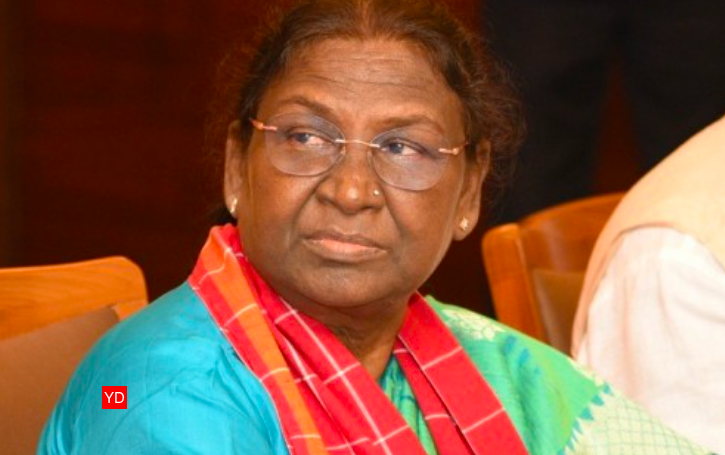President-designate of India Droupadi S. Murmu is not new to records and several are already to her credit in a dizzying political career spanning barely a quarter century, zooming from a Municipal Councillor in 1997 to the country’s First Citizen in 2022, for which she will take the oath on Monday (July 25).
With this, Murmu will be the first tribal, second woman, post Pratibha Patil (2007-2012), and the latest President with a teaching background after Dr. S. Radhakrishnan (1962-1967), Dr Zakir Hussain (1967-69), Dr Shankar Dayal Sharma (1992-1997), K.R. Narayanan (1997-2002), and Pranab Mukherjee (2012-17), ascending to the country’s highest office.
A stern disciplinarian, as acknowledged by her daughter Itishree Ganesh Hembram, her teaching experience may prove handy – brooking no nonsense from errant politicians, but without wielding the proverbial cane!
At 64, Murmu will be the youngest-ever President, pipping the record-holder, Neelam Sanjiva Reddy (1977-1982), who also took office at 64, by a couple of months.
As Murmu prepares to enter the majestic Presidential Palace, her thoughts would stray to her humble beginnings in the small village of Uparbeda, Odisha, where she is born in a Santhal tribe family, and had two brothers — Bhagat (deceased) and Taranisen, who is now her close aide.
A brilliant student, she later went on to become the first graduate from the tribal hamlet where once her father Biranchi Tudu and grandfather Narayan Tudu lorded as ‘Sardars’ (head-men).
While leaving her primary school, the headmaster mechanically asked what she planned to do in life, the little Droupadi innocently replied, “public service”, but five decades later, he realised that she had fulfilled her childhood ambition.
After her schooling, uncle, Kartik Charan Majhi, a former MLA and Minister (1967), took her to Bhubaneswar to enable her complete her higher education, and graduated as a B.A. (1979) from the Rama Devi Women’s College.
That year, she secured a clerical job in the Odisha government and worked there for several years and meanwhile, got married to a Bank of India employee, Shyam Charan Murmu, who lived in Pahadpur, around 10 km from Uparbeda.
Their first child, a daughter died aged three, devastating the young couple, who later had two sons — Lakshman and Sipun, and a daughter Itishree, though whom the Murmu family later established a “Maharashtra connect”.
Murmu soon quit her government job to care for the family but took up teaching as honorary Assistant Professor at Sri Aurobindo Integral & Educational Research, in Rairangpur.
In the early 1990s, she was noticed by some senior Bharatiya Janata Party leaders as a rare, educated, working tribal woman and cajoled her to take up public service.
In 1997, the BJP fielded Murmu for the Rairangpur Municipal Council elections and she was elected as a Councillor – green-signalling her spiralling political career.
The greenhorn councillor took her job seriously, people were taken aback to see Murmu leading from the front, hands-on on the roads, solving civic problems and other basic issues, when most elected representatives notoriously “vanish” post-polls!
Three years later, in 2000, she became a BJP MLA, repeated the feat in 2004 and also served as a Minister of State for five years handling various portfolios, and in 2015 became the first woman-ever from Odisha to be appointed Governor of Jharkhand.
The trail-blazer route from 2000-2015 had many pitfalls, her elder son Lakshman died in 2009, she lost her second son Sipun in an accident in 2013, and her husband Shyam Charan passed away due to a heart attack in 2014, leaving her shattered.
“After her first son’s death, she veered to religion and meditation with the Brahma Kumaris, and craved inner solace to calm her distressed soul. It helped — upon Sipun’s demise, Droupadiji even urged people not to visit as ‘mourners’ but as ‘guests’, and remained composed despite the major personal tragedies,” said Odisha BJP Vice-President Sukeshi Oram.
A prominent tribal leader herself, Oram remembers how they met regularly at various BJP events, shared accommodation, travelled together, but she barely displayed any trace of the emotional scars of the huge personal calamities she had endured.
“She behaved at ease with everyone, rarely getting flustered… But whenever she could, she would immerse in spiritual activities and meditation, and even today is up very early in the morning for it,” said Oram.
Later, Murmu founded the ‘Shyam, Lakshman, Sipur Memorial Residential School for Tribal Girls’ in her erstwhile family home and has donated most of her ancestral assets, according to Oram.
In 2008, Murmu travelled to Pune to “see off” Itishree who would pursue a 3-year Post Graduate Diploma in Management, specialising in Human Resources and International Management, from the Suryadatta Institute of Management & Mass Communication (SIMMC), and is now a manager with UCO Bank.
“Madam Murmu had come to drop off her daughter like other parents, they were very friendly with everybody… Itishree beti lived in the campus hostel, was a bright student who mingled with all,” said SIMMC Director Prof. Sanjay Chordiya.
In 2006, Murmu turned a vegetarian, and now relishes only Satvik food, enjoys cooking and on special occasions, she would drop in at the Ranchi Raj Bhavan kitchen to guide the chefs to include a dash of Odisha cuisine for the VIPs.
Murmu loves to drape Santhal tribal sarees, but is equally at ease in other styles, a family member revealed how she has asked them to take around a dozen (sarees) with them to New Delhi, as she will take the oath in her traditional attire on Monday.
With public consciousness uppermost in her mind since her school days, Murmu has donated blood over 100 times and planted 1,000 saplings in different places, displaying her eco-friendly streak.
Inaugurating her five-year sojourn on a sweet note, Murmu has specially ordered a good quantity of “arisa pitha”, a rice-jaggery-cardamom-ghee-sesame preparation, to tickle VVIP palates!

























Add Comment